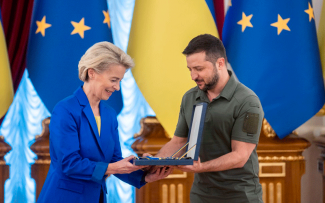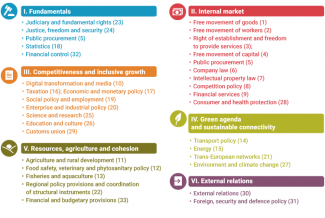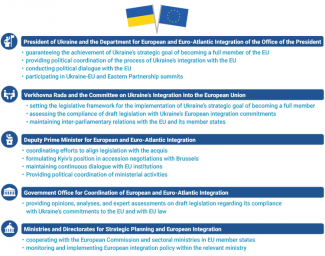Cluster, open up! Ukraine’s opportunities and risks on the road to the EU

Poland’s presidency of the Council of the EU, which started on 1 January this year, is seen by Ukraine as an opportunity to inject new momentum into its EU integration process. Ukraine aims to open accession negotiations in at least three of the six clusters, with the remaining three to follow during the next six-month term under Denmark’s presidency. Progress on these plans depends on securing the approval of all EU member states regarding Ukraine’s fulfilment of the criteria for opening each individual chapter. For the first cluster – the most critical, as it is a prerequisite for opening subsequent ones and concerns the fundamentals – member states must endorse three roadmaps developed by Ukraine and agreed with the European Commission.
Gaining unanimous support from EU members has already proven difficult. In February, Hungary blocked the opening of the first cluster, demanding expanded rights for the Hungarian minority. Within Ukraine, the implementation of EU legislation is hindered by the ongoing war with Russia, as well as the institutional and political limitations affecting the state administration. A major challenge lies in the limited capacity – both in terms of expertise and staffing – of government bodies responsible for implementing reforms and aligning national legislation with the EU acquis. Ukrainian decision-makers are also convinced that progress in the European integration process depends less on the scale and pace of reforms and more on the political will of EU member states.
Integration revival
Since Ukraine submitted its application for EU membership in February 2022, it has intensified its efforts related to the European integration process. [1] The Ukrainian government – aware of the historic opportunity presented by the EU’s support amid the war with Russia and the framing of accession as a form of solidarity with a country under attack – is striving to maintain a rapid pace of integration. In February, Prime Minister Denys Shmyhal announced that Ukraine would be ready to adopt the entire body of EU law within a year and a half at the latest.
This optimistic scenario, supported by the European Commission but contingent on numerous reforms, envisions member states granting approval to open all six clusters – comprising 33 negotiating chapters – by the end of 2025. Looking further ahead, two additional chapters would be opened: one concerning representation in EU institutions, and another covering any issues that may arise during negotiations but are not addressed under existing chapters.[2] Under this timeline, the first cluster would be opened in April, the second (concerning the internal market) and the sixth (concerning external affairs) in June, with the remaining three to be opened by the end of the year.
Chart 1. The acquis communautaire divided into clusters and negotiating chapters within the EU integration process

Source: ‘The EU accession process – step-by-step’, European Commission, October 2024, enlargement.ec.europa.eu.
The European Union treats the first cluster as a priority, as it concerns fundamental issues related to the rule of law, the functioning of democratic institutions, the judicial system and public administration reform. The criteria for meeting these requirements are highly general and, to a large extent, do not involve the adoption of specific legal regulations. This leaves considerable room for interpretation and means that formal recognition of progress depends as much on the success of reforms as on the assessment of member states. This cluster is opened first and closed last, and if there is insufficient progress in this area, this may significantly slow down the entire negotiation process.
To meet the formal opening benchmarks for the first cluster, Ukraine, in cooperation with the European Commission, has developed three roadmaps covering the rule of law, public administration reform, and the functioning of democratic institutions. These roadmaps focus in particular on reforming electoral regulations (including better enforcement of voting secrecy in polling stations, greater transparency in political party financing, and ensuring equal media access for political forces), as well as increasing the involvement of the opposition and civil society in parliamentary work. Combating corruption will be a key element in assessing progress within each cluster.
The roadmaps were based on the findings of the screening process – completed in January – which assessed the alignment of Ukrainian legislation with EU law in the thematic areas covered by the first cluster. Once adopted, the European Council will decide unanimously to open the first cluster, followed by subsequent clusters and negotiating chapters. If progress is considered satisfactory, the European Commission may recommend the ‘provisional closure’ of a given cluster or chapter. However, the decision to open or close them rests solely with the Council of the European Union, and must be unanimous.
Hungary has obstructed Kyiv’s ambitious plans. In mid-February, it refused to approve the opening of the first cluster. The official justification was a long-standing demand for changes to Ukrainian legislation concerning national minorities,[3] – a demand which has, in effect, served as a pretext for blocking not only Ukraine’s accession process but also various forms of EU assistance to the country during wartime. President Volodymyr Zelensky called on European leaders to compel Budapest to stop its ‘mindless’ opposition to opening the clusters.[4]
Fundamental problems
The European Commission, and in particular its President Ursula von der Leyen, is encouraging Ukraine to intensify its efforts and has expressed support for opening all clusters by the end of 2025. However, this goal may be undermined by stalled reforms in the judicial system and law enforcement agencies, initiated after 2014, which have consistently posed challenges for successive governments. At the same time, the work of the institutions responsible for combating corruption – primarily the National Anti-Corruption Bureau of Ukraine and the Specialised Anti-Corruption Prosecutor’s Office – is regularly disrupted by conflicts fuelled by political ambitions and the authorities’ reluctance to allow genuinely independent institutions to operate.[5]
Although Ukraine has formally fulfilled the European Commission’s recommendations on the judicial system – including the implementation of legal provisions on the procedure for selecting Constitutional Court judges and the resumption of operations by the bodies responsible for judicial appointments and oversight (the High Qualification Commission of Judges and the High Council of Justice) – this sector remains one of the most prone to corruption and most vulnerable to political interference.[6]
Another key task within the first cluster will be public administration reform. The main objectives of this reform are to establish a competent and independent civil service, ensure a transparent administrative decision-making process, and reduce political interference in the functioning of state administrative bodies. A significant obstacle to achieving these goals is the state of martial law, in place since February 2022. The restrictions introduced under this regime – including the closure of certain public registers (such as those covering legal entities, sole proprietors, and public organisations; financial reports of state-owned enterprises; and court rulings), reduced public oversight of legislative processes, the cancellation of competitive recruitment for public service posts, and limited access to civil servants’ asset declarations – have led to a significant decline in transparency within the public administration.
By contrast, the situation appears much more favourable in the sixth cluster – external relations – which covers the alignment of Ukraine’s foreign, security, and defence policy with that of the EU. In its report of 30 October 2024, which provided a detailed assessment of Ukraine’s preparedness for accession, the European Commission rated the country as ‘well prepared’ in this area.[7]
It is important to note that Kyiv is not starting the process of adapting the acquis communautaire from scratch. A key advantage lies in Ukraine’s ongoing sectoral integration with the EU single market, which began in January 2016 under the Deep and Comprehensive Free Trade Area (DCFTA) agreement – part of the Association Agreement (AA) in force since September 2017. This framework has enabled Ukraine to prepare institutionally and methodologically for the process of aligning with EU law. In fulfilling the commitments arising from these agreements, Kyiv has made tangible progress in harmonising legislation relating to business operations, public procurement, and the free movement of people and capital. According to Ukrainian authorities, the country has already implemented as much as 81% of all obligations stemming from the AA.[8] However, reforming legal provisions governing EU citizens’ access to the Ukrainian labour market remains a challenge. Nonetheless, as both the AA and DCFTA provide for only partial synchronisation of Ukrainian legislation with EU law – rather than full adaptation – much work still lies ahead.
Institutional architecture of EU integration
Since 2016, the Deputy Prime Minister for European and Euro-Atlantic Integration has served as the key official coordinating Ukraine’s rapprochement with the EU. This official chairs the Government Committee on European and Euro-Atlantic Integration, International Cooperation, Security, Defence, and Regional Development. The committee includes deputy ministers from each ministry, appointed specifically to oversee European integration matters. Since June 2020, this position has been held by Olha Stefanishyna, who has also served as Minister of Justice since September 2024.
In June 2024, Stefanishyna led a 35-member delegation responsible for negotiations with the EU, and in August she was appointed chair of the Interagency Working Group on Ukraine’s Accession Negotiations with the EU. As chief negotiator, she is responsible for coordinating the adaptation of the acquis and formulating Kyiv’s position in accession talks with Brussels. Another politically significant body is the Department for European and Euro-Atlantic Integration within the Office of the President, established in 2021. It is headed by Ihor Zhovkva, one of the deputies to the head of the Office of the President, Andriy Yermak. The department’s tasks include coordinating the European integration process in consultation with Deputy Prime Minister Stefanishyna.
In addition to the deputy ministers for European integration, since 2017 selected ministries have also housed Directorates for Strategic Planning and European Integration. The tasks of these bodies include cooperation with the European Commission and sectoral ministries in EU member states, as well as monitoring and implementing European integration policy within their respective ministries. The body tasked with providing opinions, analyses, and expert assessments of draft legislation – specifically regarding its compliance with Ukraine’s commitments to the EU and with EU law – is the Government Office for Coordination of European and Euro-Atlantic Integration, established in 2014. Since 2023, it has been headed by Oleksandr Ilkov.
Since 2002, the Verkhovna Rada of Ukraine has operated a parliamentary Committee on Ukraine’s Integration into the European Union. Its role is to assess the alignment of every legislative proposal with the country’s European integration commitments. However, the committee’s opinions are not legally binding and carry no formal consequences. It is also responsible for maintaining inter-parliamentary relations with the EU and its member states. Although the committee is chaired by opposition MP Ivanna Klympush-Tsintsadze from European Solidarity, during the current parliamentary term the Verkhovna Rada has passed 93% of the bills reviewed by this body.[9] In general, pro-European legislation enjoys broad cross-party support, with an average of 62% of MPs from all parties voting in favour. The remainder mostly abstain or are absent during the vote.[10]
The de facto political control exercised by the Office of the President (OP) over other centres of authority – particularly the Deputy Prime Minister for European Integration – may undermine the transparent division of responsibilities among the institutions involved. Despite the previously effective cooperation between Olha Stefanishyna and Ihor Zhovkva, this arrangement raises concerns about how key decisions in the EU negotiation process are made. It also carries the risk of excessive politicisation of the European integration process, as the OP leadership tends to prioritise image-building outcomes.
Chart 2. Bodies responsible for Ukraine’s integration with the EU

Source: Associatio4U, facebook.com/association4u.ua.
Insufficient administrative capacity…
The ongoing war with Russia has significantly affected the capacity of Ukraine’s public administration. One of the main challenges is the loss of personnel due to emigration (including mid-level female civil servants), the military mobilisation of men, and resignations triggered by salary cuts. The average monthly salary of a public servant is around $500, while a department head earns no more than $1,000. As a result, most civil service positions are now filled either by older staff lacking the necessary skills and motivation or by very young individuals with limited experience or knowledge.
A further serious issue is the lack of English language proficiency. Only one third of civil servants possess language skills at the B1 level, while just 16% are at B2 or higher. Moreover, only around 60% of officials involved in the integration process have an adequate understanding of how EU law is developed.[11] Translating EU documentation – which often requires knowledge of complex and technical legal terminology – is time-consuming and requires a substantial share of administrative resources.[12] Nevertheless, the situation is gradually improving due to training programmes at the National School of Public Administration (under the Eastern Partnership Academy of Public Administration) and at the College of Europe in Natolin, as part of the Natolin4Capacity Building project. Additional support will come from professional internship schemes at the European Commission for Ukrainian officials.[13]
Another factor discouraging individuals from entering public service is the anti-corruption monitoring of civil servant positions. The civil service also lacks social prestige, which reduces interest among ambitious and well-educated individuals. The challenges facing the civil service are further compounded by the current regulatory framework. The law passed in 2019 requiring competitive recruitment for civil service posts was suspended in 2020 due to the COVID-19 pandemic. In 2022, as wartime expenditures increased, civil servant salaries were further reduced. This personnel shortage has led institutions responsible for European integration – especially the Government Office for Coordination of European and Euro-Atlantic Integration – to rely increasingly on external consultants and experts.
The capacity of Ukraine’s EU integration administration may also be affected by the closure of the United States Agency for International Development (USAID), which had provided substantial financial support for reform programmes in key areas.[14] To some extent, this gap may be filled by EU initiatives, such as the Danish-Lithuanian support project launched in April 2025.[15]
…and the significant role of the non-governmental sector
To compensate for gaps in expertise and staffing, the authorities have sought to deepen cooperation with the non-governmental sector and Western consulting firms.[16] This trend is partly the result of frequent transfers of civil servants to the private analytical sector, where they often perform the same tasks but for higher salaries, financed through technical assistance projects supported by EU institutions and agencies of certain member states.[17] The government commissions expert analyses on EU law and drafts of official documents, including legislative proposals. A notable example of the effectiveness of such cooperation was the rapid preparation of the EU accession questionnaire in March of this year by think tank staff, supported by the European Commission’s Directorate-General for Neighbourhood and Enlargement Negotiations (DG NEAR).
However, this outsourcing has also led to a partial transfer of responsibility to external actors. This weakens the sense of ownership among civil servants and limits their knowledge and understanding of the processes involved in aligning national legislation with EU standards. As a result, there is likely to be a low level of institutional memory regarding the legal harmonisation process. Moreover, due to pressure from central authorities to accelerate the adaptation of EU law, this process often takes on a superficial character – referred to as ‘fakering’ – with civil servants primarily focused on translating and reformatting externally supplied materials.
The government is aware of these administrative limitations. In 2023, as the main conclusion of the so-called self-screening exercise, Kyiv acknowledged that the institutional capacity of state bodies was insufficient to carry out an effective adaptation of EU law. To address this, it has proposed increasing the number of specialists within the civil service, securing additional financial resources, and engaging international experts through technical assistance programmes.[18] In some areas, setting up additional specialised institutions has also been suggested.
Domestic political background
The implementation of EU law may be hampered by the specific political dynamics of Ukraine’s administrative system. Deputy Prime Minister Olha Stefanishyna’s position remains secondary to that of the Office of the President (OP), which holds decisive authority over key aspects of both domestic and foreign policy. While cooperation has thus far been constructive, the OP’s primary focus remains on image-building success and the pursuit of political objectives, frequently accompanied by delays or the dilution of essential reforms. One example is the stalled reform of the Secur
ity Service of Ukraine, as well as the requirement to repeal the so-called ‘Lozovyi’s amendments’ to the criminal procedure code, which hinder investigations into corruption cases.
In Kyiv, there is a prevailing belief that decisions on European integration depend primarily on the political will of EU member states and the European Commission, rather than on Ukraine’s actual reform progress. Consequently, repeated public statements by President Zelensky,[19] Prime Minister Shmyhal,[20] and Deputy Prime Minister Stefanishyna,[21] – that Ukraine will meet all EU requirements within just two years of starting negotiations – serve as a form of pressure on Brussels and the member states. However, such declarations often have the opposite effect, provoking irritation within the Commission and among member states, and leading to criticism of Ukraine’s lack of understanding of the accession process. These statements are also directed at the domestic audience, aiming to reassure the public of the government's and President Zelensky’s commitment. Yet this communication strategy tends to downplay Brussels’ dissatisfaction with the pace of reform, particularly in the judiciary, security services, and anti-corruption efforts.[22]
Nevertheless, it is worth emphasising that the launch of accession negotiations marks the culmination of just a year and a half of reform implementation following the European Commission’s recommendations.[23] Ukraine has succeeded in fulfilling the vast majority of these, including those relating to the procedure for appointing Supreme Court judges, the judiciary’s governing bodies, anti-corruption institutions, media legislation, de-oligarchisation laws, and minority rights.
Conclusions: an integration minefield
The EU’s approval to open the first cluster would mark a significant achievement for the Ukrainian authorities, as it would formally enable the opening of subsequent clusters. However, this will require unanimity in the Council of the EU at each stage, meaning the accession process could be blocked up to 100 times – as approval is required to both open and close each of the 35 negotiating chapters.[24] This suggests that the process will be lengthy: highly bureaucratic on the one hand, and on the other, subject to political bargaining and intra-EU negotiations.
Prolonged accession talks risk fuelling public disillusionment in Ukraine. Kyiv is likely to shift the blame for a lack of progress onto the EU and individual member states. Ukrainian assertiveness towards Brussels is expected to grow, particularly as both the government and society view EU accession as an integral part of victory over the aggressor. Finding a solution that meets Ukrainian expectations, while taking into account the current limitations of the country’s administrative system and minimising the influence of member states opposed to Ukraine’s accession – such as Hungary – will be crucial. Such a strategy is essential not only for sustaining Ukraine’s European aspirations, but also for ensuring long-term stability in Eastern Europe.
[1] K. Nieczypor, A. Sadecki, M. Szpala, ‘Ukraine opens accession negotiations with the EU’, OSW, 26 June 2024, osw.waw.pl.
[2] ‘The EU accession process – step-by-step’, European Commission, October 2024, enlargement.ec.europa.eu.
[3] M. Jędrysiak, K. Nieczypor et al., ‘Ukraine: another amendment to the law on national minorities’, OSW, 13 December 2023, osw.waw.pl.
[4] I. Gizińska, A. Sadecki, K. Sienicki, ‘Hungary hardens its stance on Ukraine’, OSW, 28 March 2025, osw.waw.pl.
[5] J. Rogoża, ‘Ukraine: the Specialised Anti-Corruption Prosecutor's Office has a new head’, OSW, 20 July 2022, osw.waw.pl
[6] According to a public opinion poll published in March 2025, commissioned by the National Agency on Corruption Prevention, a significant proportion of Ukraine’s population – nearly 80% of respondents – considers corruption to be the country’s most serious problem, aside from the ongoing conflict with Russia. For the third consecutive year, respondents identified the judiciary as the most corrupt sector. See ‘National Agency on Corruption Prevention’, 2025, nazk. gov.ua.
[7] K. Całus, K. Nieczypor, ‘A window with a view of membership: Ukraine's and Moldova's progress on the path to the EU’, OSW Commentary, no. 634, 29 November 2024, osw.waw.pl.
[8] According to independent experts, by the end of 2022 (the most recent available data), Kyiv had implemented approximately 55% of its commitments under the Association Agreement, of which only around 30% were fully fulfilled. In contrast, roughly 20% of commitments saw no progress, while 47% were only partially fulfilled. By comparison, the authorities reported a 72% implementation rate for the same period. See Ukraine and the Association Agreement Implementation Monitoring 2014-2022, Ukrainian Centre for European Poliсy, Kyiv 2023, ucep.org.ua.
[9] С. Лазарова, В. Мікула, ‘Євроінтеграційні законопроєкти мають найвищу підтримку у Верховній Раді’, ЧЕСНО, 7 January 2025, chesno.org.
[10] О. Саліженко, ‘Через терни до зірок: як Верховна Рада адаптує українське законодавство до вимог ЄC’, ЧЕСНО, 25 June 2024, chesno.org.
[11] Data based on a survey conducted by analysts from a Ukrainian think tank: O. Bulana et al., Towards European Integration. A Study of Existing Projects, Stakeholder Needs, and Resource Optimization in Ukraine, Ukrainian Centre for European Policy, Kyiv 2023, ucep.org.ua.
[12] To address this issue, a dedicated translation office is to be established, based on a decision issued by the Cabinet of Ministers on 5 December 2024. However, given the history of previous, unsuccessful attempts to create similar institutions and the absence of allocated funding for this purpose in the 2025 state budget, the prospects for implementation should be viewed with caution. See Є. Курілов, ‘Офіс перекладів: Спроба номер… або торуємо дорогу до Європейського Союзу’, Юридична практика, 19 December 2024, pravo.ua.
[13] The agreement to this effect was signed on 24 February 2025 by Deputy Prime Minister Olha Stefanishyna and the EU Commissioner for Budget, Anti-Fraud, and Public Administration, Piotr Serafin. ‘Держслужбовці з України будуть проходити стажування у Єврокомісії: підписано відповідну домовленість’, Урядовий портал, 25 February 2025, kmu.gov.ua.
[14] Key initiatives have included the Justice for All programme, which supports judicial reform; the DOBRE (Decentralization Offering Better Results in Efficiency) programme, dedicated to administrative decentralisation in line with EU standards; and the SACCI (Support to Anti-Corruption Champion Institutions) programme, which focuses on developing anti-corruption institutions such as the National Agency on Corruption Prevention (NAZK) and the Specialised Anti-Corruption Prosecutor’s Office (SAP).
[15] ‘EU, jointly with Denmark and Lithuania, launch EUR 14 million programme to support Ukraine's accession path’, Government portal, 22 January 2025, kmu.gov.ua.
[16] One example is the Legislative Initiatives Laboratory, which prepares reports and assessments related to individual negotiating chapters and is funded by the French government. Another is the Think Tank Development Initiative, supported by the Renaissance Foundation.
[17] An example is the EU-funded Pravo-Justice project, which provides grants to NGOs for developing proposals for legal reforms in the area of the judiciary, ‘EU Project Pravo-Justice Announces a Grant Programme to Support Ukraine on the Path of European Integration in the Justice Sector’, Pravo-Justice, 20 December 2024, pravojustice.eu.
[18] Звіт за результатами проведення первинної оцінки стану імплементації актів права Європейського Союзу (acquis ЄС), Урядовий офіс координації європейської та євроатлантичної інтеграції, 14 December 2023, eu-ua.kmu.gov.ua.
[19] Я. Прищепа, ‘Зеленський сподівається, що Україна вступить у ЄС за 2 роки’, Суспільне новини, 11 February 2023, suspilne.media.
[20] ‘Уряд очікує на членство в ЄС протягом двох років’, Дзеркало тижня, 13 January 2023.
[21] Т. Степанова, Д. Левицький, ‘When Ukraine can join the EU: Cabinet of Ministers and expert's assessments’, RBC Ukraine, 9 October 2023, rbc.ua.
[22] І. Нагорняк, М. Шаламберідзе, ‘Ключовий розділ переговорів з ЄС: які реформи має впровадити Україна’, Європейська правда, 18 March 2025, eurointegration.com.ua.
[23] K. Nieczypor, M. Szpala, A. Sadecki, ‘The EU opens accession talks with Ukraine and Moldova’, OSW, 15 December 2024, osw.waw.pl.
[24] ‘Орбан підтвердив погрозу надалі блокувати вступ України в ЄС’, Європейська правда, 15 December 2023, eurointegration.com.ua.




